北师大版初三英语第6讲:unit3语法篇(学生版)-
新北师大版九年级英语第三单元讲解
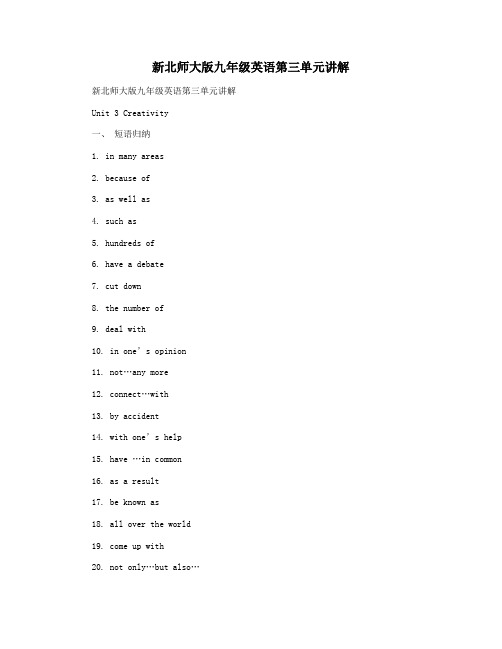
新北师大版九年级英语第三单元讲解新北师大版九年级英语第三单元讲解Unit 3 Creativity一、短语归纳1. in many areas2. because of3. as well as4. such as5. hundreds of6. have a debate7. cut down8. the number of9. deal with10. in one’s opinion11. not…any more12. connect…with13. by accident14. with one’s help15. have …in common16. as a result17. be known as18. all over the world19. come up with20. not only…but also…21. come ture22. one of + the +最高级+名词复数23. be interested in doing sth24. It takes somebody +时间 to do sth25. This is why + 句子26. be able to do sth二、语法知识1、原因状语从句的引导词 because, since, as(1) because 引导原因状语从句,语气最强,表示直接原因。
Because 引导的原因状语从句一般放在主句之后,也可单独存在。
He was late because he got up late(2) since 引导原因状语从句,语气比because弱,意思是“因为,既然”侧重主句,从句表示显然或者已知的理由。
Since引导的从句一般放在主句前。
Since everyone is here, let’s discuss the problem.(3) as 语气最弱。
由于的意思。
As she is kind, we all like her.2、连词短语 as well as(1) 和… 一样好She sings as well as she dances.Mike looks as well as he did three years ago.(2) 也,还My sister is clever as well as beautiful.Helen as well as I is watching TV now.。
人教版初三(上)英语第6讲:UNIT 3 语法篇(学生版)
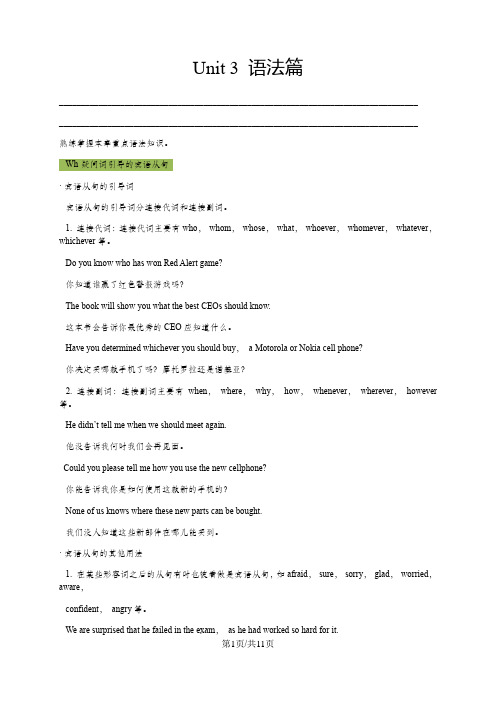
Unit 3 语法篇____________________________________________________________________________________________________________________________________________________________________熟练掌握本章重点语法知识。
Wh-疑问词引导的宾语从句·宾语从句的引导词宾语从句的引导词分连接代词和连接副词。
1. 连接代词:连接代词主要有who,whom,whose,what,whoever,whomever,whatever,whichever等。
Do you know who has won Red Alert game?你知道谁赢了红色警报游戏吗?The book will show you what the best CEOs should know.这本书会告诉你最优秀的CEO应知道什么。
Have you determined whichever you should buy,a Motorola or Nokia cell phone?你决定买哪款手机了吗?摩托罗拉还是诺基亚?2. 连接副词:连接副词主要有when,where,why,how,whenever,wherever,however 等。
He didn’t tell me when we should meet again.他没告诉我何时我们会再见面。
Could you please tell me how you use the new cellphone?你能告诉我你是如何使用这款新的手机的?None of us knows where these new parts can be bought.我们没人知道这些新部件在哪儿能买到。
·宾语从句的其他用法1. 在某些形容词之后的从句有时也被看做是宾语从句,如afraid,sure,sorry,glad,worried,aware,confident,angry等。
北师大版初二(上)英语第6讲:unit 3 语法篇(教师版)

Unit 3语法篇____________________________________________________________________________________________________________________________________________________________________理解并掌握形容词比较级、最高级的用法形容词比较级、最高级一、形容词比较级、最高级变化规则1.单音节词的变化:2. 双音节、多音节词的变化:(1) 少数以-er, ow, -ble结尾的双音节词,末尾加-er(比较级),-est(最高级)。
以-e结尾的词只加-r和-st。
eg: clever cleverer cleverest narrow narrower narrowest able abler ablest,其他双音节都在前面加单词more和most。
(2) 多音节词三个或三个以上音节的形容词只能加more和most。
例如:more/most beautiful但是,以形容前缀un开头的三音节形容词不适合上述情况,如unhappy, untidy,我们可以说:unhappier→unhappiest untidier→untidiest(3) 由--ing分词和--ed分词演变过来的形容词(包括不规则动词如know→known)只能加more或most来表示它们的比较级和最高级。
more(most) striking more(most) interesting more(most) wounded3. 不规则形式good /well better bestbad /ill worse worstmany /much more mostlittle less leastfar farther farthest /further furthestold older oldest /elder eldest二、形容词原级、比较级和最高级的用法1. 形容词原级用法:(1)修饰原级的词:very, too, so, quite(2)同级比较as + adj 原级+ as 例如:Tom is as tall as Mike. Tom和Mike一样高。
九年级英语unit3语法知识点
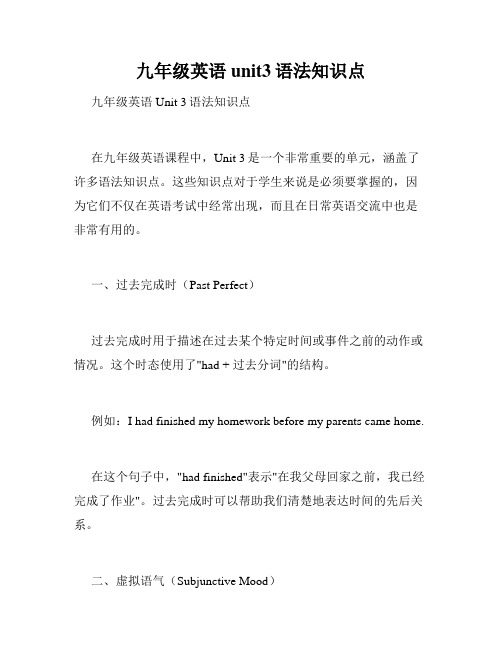
九年级英语unit3语法知识点九年级英语Unit 3语法知识点在九年级英语课程中,Unit 3是一个非常重要的单元,涵盖了许多语法知识点。
这些知识点对于学生来说是必须要掌握的,因为它们不仅在英语考试中经常出现,而且在日常英语交流中也是非常有用的。
一、过去完成时(Past Perfect)过去完成时用于描述在过去某个特定时间或事件之前的动作或情况。
这个时态使用了"had + 过去分词"的结构。
例如:I had finished my homework before my parents came home.在这个句子中,"had finished"表示"在我父母回家之前,我已经完成了作业"。
过去完成时可以帮助我们清楚地表达时间的先后关系。
二、虚拟语气(Subjunctive Mood)虚拟语气用于表示非现实的、不可能实现的条件、愿望或建议。
在虚拟语气中,谓语动词的形式通常是"should + 动词原形"。
例如:If I were you, I would study harder.在这个句子中,"were"是"be"的过去式,用于表示"假设"的条件。
虚拟语气在表达愿望、建议和与现实相反的情况时非常常见。
三、定语从句(Relative Clauses)定语从句是用来修饰名词的从句,通常由关系代词(who, whom, whose, which, that)或关系副词(where, when)引导。
例如:The book that I borrowed from the library is very interesting.在这个句子中,"that I borrowed from the library"修饰了先行词"book",用于限定"我从图书馆借来的那本书"。
北师大版初二(上)英语第6讲:unit 3 语法篇(学生版)
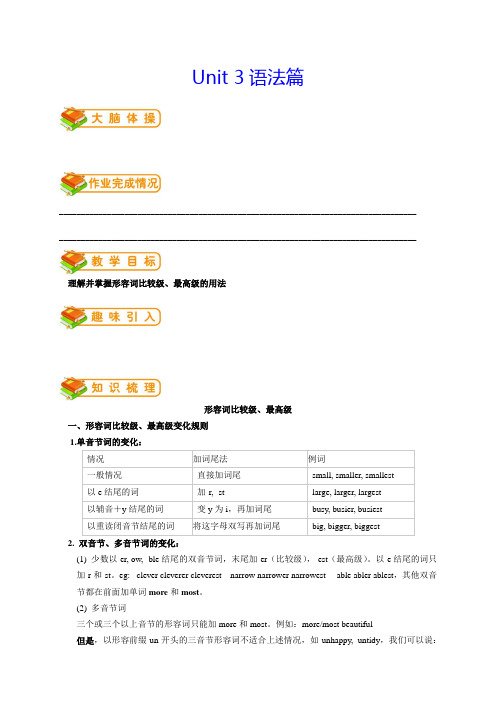
Unit 3语法篇____________________________________________________________________________________________________________________________________________________________________理解并掌握形容词比较级、最高级的用法形容词比较级、最高级一、形容词比较级、最高级变化规则1.单音节词的变化:2. 双音节、多音节词的变化:(1) 少数以-er, ow, -ble结尾的双音节词,末尾加-er(比较级),-est(最高级)。
以-e结尾的词只加-r和-st。
eg: clever cleverer cleverest narrow narrower narrowest able abler ablest,其他双音节都在前面加单词more和most。
(2) 多音节词三个或三个以上音节的形容词只能加more和most。
例如:more/most beautiful但是,以形容前缀un开头的三音节形容词不适合上述情况,如unhappy, untidy,我们可以说:unhappier→unhappiest untidier→untidiest(3) 由--ing分词和--ed分词演变过来的形容词(包括不规则动词如know→known)只能加more或most来表示它们的比较级和最高级。
more(most) striking more(most) interesting more(most) wounded3. 不规则形式good /well better bestbad /ill worse worstmany /much more mostlittle less leastfar farther farthest /further furthestold older oldest /elder eldest二、形容词原级、比较级和最高级的用法1. 形容词原级用法:(1)修饰原级的词:very, too, so, quite(2)同级比较as + adj 原级+ as 例如:Tom is as tall as Mike. Tom和Mike一样高。
九年级英语第六单元3a知识点
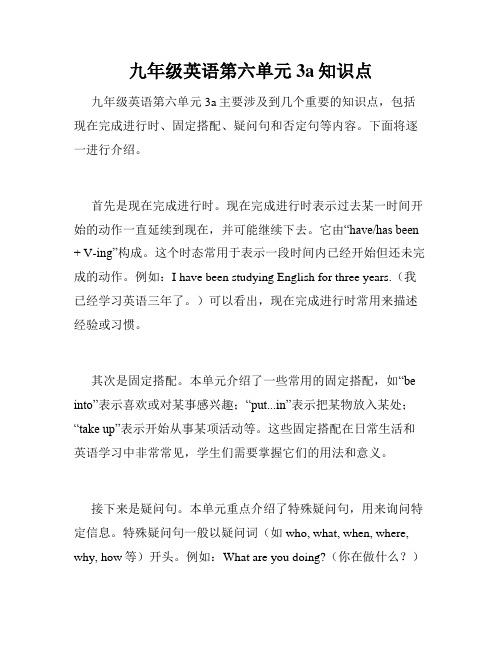
九年级英语第六单元3a知识点九年级英语第六单元3a主要涉及到几个重要的知识点,包括现在完成进行时、固定搭配、疑问句和否定句等内容。
下面将逐一进行介绍。
首先是现在完成进行时。
现在完成进行时表示过去某一时间开始的动作一直延续到现在,并可能继续下去。
它由“have/has been + V-ing”构成。
这个时态常用于表示一段时间内已经开始但还未完成的动作。
例如:I have been studying English for three years.(我已经学习英语三年了。
)可以看出,现在完成进行时常用来描述经验或习惯。
其次是固定搭配。
本单元介绍了一些常用的固定搭配,如“be into”表示喜欢或对某事感兴趣;“put...in”表示把某物放入某处;“take up”表示开始从事某项活动等。
这些固定搭配在日常生活和英语学习中非常常见,学生们需要掌握它们的用法和意义。
接下来是疑问句。
本单元重点介绍了特殊疑问句,用来询问特定信息。
特殊疑问句一般以疑问词(如who, what, when, where, why, how等)开头。
例如:What are you doing?(你在做什么?)特殊疑问句在交流中经常使用,因此学生们需要熟练掌握各种疑问词的用法,并能灵活运用。
最后是否定句。
在本单元的学习中,学生们需要注意否定句的构成。
一般情况下,在主系表结构中,我们将not置于be动词和主语之间。
例如:She is not eating dinner.(她没有吃晚饭。
)在其他动词后面直接加not即可构成否定句。
这个知识点虽然简单,但在实际应用中经常使用,需要学生们加以理解和掌握。
在学习九年级英语第六单元3a知识点的过程中,我们需要注意以下几点。
首先,要勤于复习和巩固所学的知识,通过做题和语言练习来强化记忆。
其次,要注重运用所学的知识,通过口语和写作的练习来提高语言表达能力。
最后,要善于总结和归纳,将所学的知识点进行整理和总结,形成自己的学习笔记,方便日后的回顾和温习。
北师大版九年级英语全册分单元知识点语法点(共9单元)(含答案)

北师大版九年级英语全册分单元知识点语法点(共9单元)(含答案)知识图谱Unit 1 Language知识精讲一、必背词汇nationality n. 国籍Australian adj. 澳大利亚的 n. 澳大利亚人Canadian n. 加拿大人adj. 加拿大的Indian n. 印度人 adj. 印度的Japanese n. 日本人;日语 adj. 日本的,日本人的Russian n. 俄罗斯人;俄语gesture n. 手势;姿势thumb n. 拇指wave v. 挥手;挥臂 n. 波浪;海浪simply adv. 仅仅,只是;简单地nod v. 点头agreement n. (意见或看法)一致;协定finger n. 手指silence n. 安静;沉默differently adv. 不同地western adj. 西方的shrug v. 耸肩shoulder n. 肩,肩膀Asian adj. 亚洲人的 n. 亚洲人bow v. 鞠躬,点头greet v. 和(某人)打招呼custom n. 习惯;风俗certain adj. 某种;肯定traveller n. 旅行者kiss v. 亲吻;n. 吻European adj. 欧洲的cheek n. 面颊,脸颊rude adj. 粗鲁的;无礼的bottom n. 底部pat v. 轻拍anger n. 怒火,怒气clap v. 鼓掌,拍手mate n. 朋友,伙伴gas n. 汽油;天然气;气体sneaker n. 运动鞋petrol n. 汽油confused adj. 糊涂的,迷惑的standard adj. 标准的,正常的 n. 标准spelling n. 拼写grey adj. 灰色的(= gray)native adj. 本地的;出生地的speaker n. 说话者;发音者;扬声器confusing adj. 难以理解的,不清楚的check n. 账单 v. 检查note n. 钞票;笔记used adj. 习惯于;用过的,旧的jumper n. (毛或棉的)针织套衫apartment n. 公寓套房tip n. 实用的提示;小费structure n. 结构chant n. 重复唱的歌词;歌谣reward v. 奖励,奖赏 n. 奖励;回报method n. 方法suit v. 适合familiar adj. 熟悉的subtitle n. 字幕phrase n. 短语,词组continuously adv.不断地,持续地image n. 图像frustrated adj. 懊丧,懊恼topic n. 主题;话题refer v. 参考;涉及table n. 表格;桌子二、重点词汇1. gesture noun /?d?est??r/1). a movement of the hands, arms, or head, etc. to express an idea or feeling手势;姿势;示意动作例句:The prisoner raised his fist in a gesture of defiance as he was led out of the courtroom.犯人在被带出法庭时,举起拳头以示抗议。
北师大版初一(上)英语第6讲:Unit Three 语法篇(学生版)--顺义刘燕
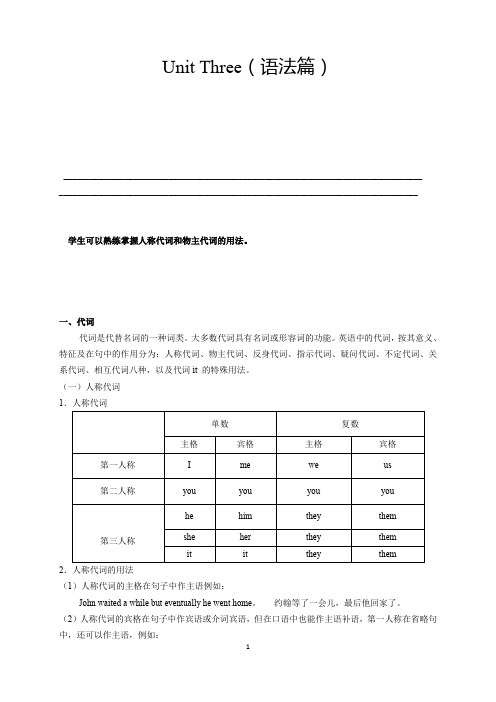
Unit Three(语法篇)____________________________________________________________________________________________________________________________________________________________________学生可以熟练掌握人称代词和物主代词的用法。
一、代词代词是代替名词的一种词类。
大多数代词具有名词或形容词的功能。
英语中的代词,按其意义、特征及在句中的作用分为:人称代词、物主代词、反身代词、指示代词、疑问代词、不定代词、关系代词、相互代词八种,以及代词it 的特殊用法。
(一)人称代词1.人称代词单数复数主格宾格主格宾格第一人称I me we us第二人称you you you you第三人称he him they them she her they them it it they them2.人称代词的用法(1)人称代词的主格在句子中作主语例如:John waited a while but eventually he went home。
约翰等了一会儿,最后他回家了。
(2)人称代词的宾格在句子中作宾语或介词宾语,但在口语中也能作主语补语,第一人称在省略句中,还可以作主语,例如:I saw her with them, at least, I thought it was her.我看到她和他们在一起,至少我认为是她。
(her做宾语,them做介词宾语,her做主语补语)3.人称代词排列顺序一般如下:(1)单数人称代词并列作主语时,其顺序为:第二人称> 第三人称> 第一人称you > he/she/it > I(2)复数人称代词作主语时,其顺序为:第一人称> 第二人称> 第三人称We > you > They注意:在下列情况中,第一人称放在前面:(二)物主代词1.表示所有关系的代词,也可叫做代词所有格。
Module6课时23Unit3Languageinuse及语法(教师版)九年级英语讲义

Module 6Unit 3Language in use 及语法目标导航重点短语 1.拒绝做某事2.积攒3.参加4.是否5.一个小角色6.因(不)做某事而警告某人重点句型 1.上课认真听,否则你将不知道要做什么。
Listen in class,or you will not understand.2.他们已经因他没有努力学习而警告他了。
They have him not working hard.3.我想参加今年学校的小提琴比赛,但是我不确定是否应该参加。
I want to the school violin petition this year,but I amnot sure I should.4.在学校话剧中,我获得了(演)主角(的机会),而琳达只得到一个小角色。
I have got in the school play,but Linda has only got asmall part.【答案】♦重点短语1.refuse to do sth.2.save up3.take part in4.whether...or not5.a small part6.warn sb.about (not) doing sth. ♦重点句型1.what to do2.warned;about3.take part in;whether;or not4.the biggest part知识精讲知识点01Eat your breakfast, or you will get hungry at school. 吃早餐,否则你在学校挨饿的。
【考点1】本句使用句型“祈使句+and/or+陈述句”,祈使句是陈述的条件,and意为“那么”,or意为“否则”。
如:Give me one more hour, and I’ll get the work finished. 再给我一个小时,我就会完成这项工作。
Hurry up, or you’ll miss the meeting. 如果你不快点,你就会错过会议。
苏版初三(上)英语第6讲:UNIT3语法篇(学生版)
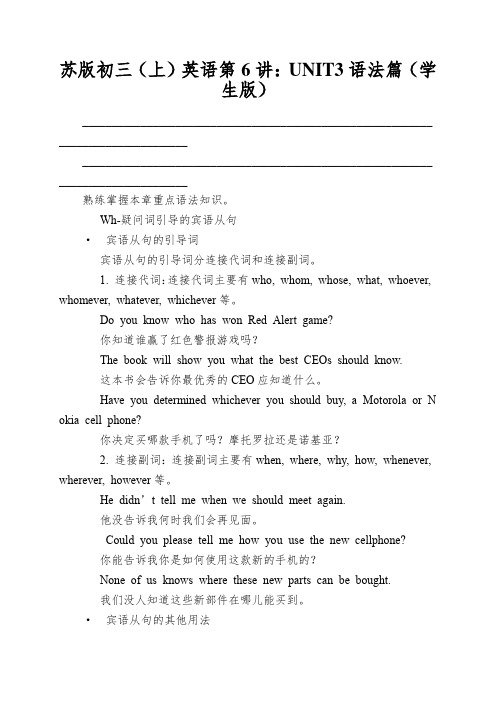
苏版初三(上)英语第6讲:UNIT3语法篇(学生版)____________________________________________________________ __________________________________________________________________________________ ______________________熟练掌握本章重点语法知识。
Wh-疑问词引导的宾语从句·宾语从句的引导词宾语从句的引导词分连接代词和连接副词。
1. 连接代词:连接代词主要有who, whom, whose, what, whoever, whomever, whatever, whichever等。
Do you know who has won Red Alert game?你知道谁赢了红色警报游戏吗?The book will show you what the best CEOs should know.这本书会告诉你最优秀的CEO应知道什么。
Have you determined whichever you should buy, a Motorola or N okia cell phone?你决定买哪款手机了吗?摩托罗拉还是诺基亚?2. 连接副词:连接副词主要有when, where, why, how, whenever, wherever, however等。
He didn’t tell me when we should meet again.他没告诉我何时我们会再见面。
Could you please tell me how you use the new cellphone?你能告诉我你是如何使用这款新的手机的?None of us knows where these new parts can be bought.我们没人知道这些新部件在哪儿能买到。
北师大版英语九年级全册Lesson6TomSawyer教学设计

3.运用问题链、思维导图等策略,引导学生深入思考,培养学生的思维品质。
4.利用多媒体教学手段,如:PPT、视频等,丰富课堂教学,提高学生的学习兴趣。
5.注重个体差异,针对不同学生的学习需求,提供有针对性的指导。
7.预习下一课:提前预习下一课的内容,为新课的学习做好准备。
作业要求:
1.学生需按时完成作业,确保作业质量。
2.家长协助监督,关注学生的学习进度,鼓励学生独立完成作业。
3.教师在批改作业时,要及时给予评价和反馈,帮助学生发现并改正错误。
4.情感态度的培养:通过本课学习,引导学生形成正确的价值观,培养良好的情感态度。
设想:结合课文内容,设计相关的讨论和活动,让学生在探讨中自然地接受情感教育。
(二)教学设想
1.导入环节:通过提问方式,引导学生回顾已学过的故事,激发学生的学习兴趣。
2.新课内容呈现:利用多媒体展示课文内容,让学生在视觉和听觉上充分感知语言材料。
四、教学内容与过程
(一)导入新课
1.教师以提问方式引导学生回顾上一课的内容,如:“Can you remember what happened in the last lesson? Who is the main character of the story?”
2.学生回答问题,教师给予表扬和鼓励,激发学生的学习兴趣。
4.布置课后作业,要求学生在课后进行巩固练习。
5.教师对本节课的教学效果进行自我反思,为下一节课做好准备。
五、作业布置
为了巩固本节课所学知识,确保学生对生词、语法、阅读和听力等方面的掌握,特布置以下作业:
1.词汇巩固:请学生将本节课所学的生词和短语整理成词汇表,并运用这些词汇造句,每个词汇至少造两个句子。
北师大版英语九年级全册Lesson6TomSawyer优秀教学案例
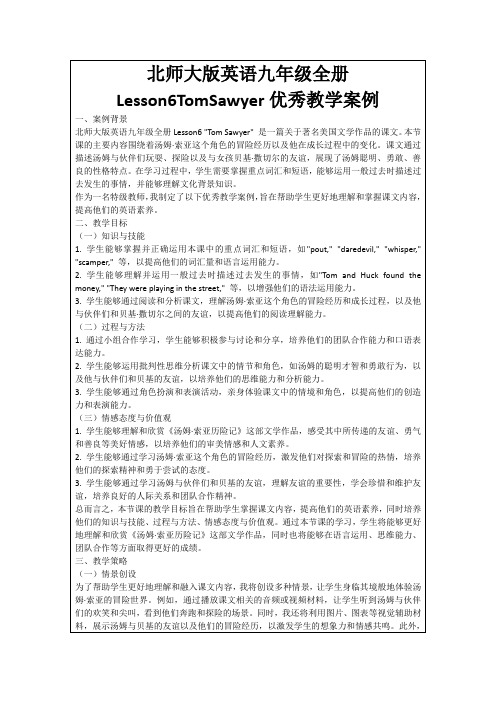
我提出了一系列问题,引导学生深入思考和分析课文内容。这些问题既涵盖了课文的主要情节和角色,也涉及了汤姆·索亚的性格特点和成长过程。通过回答这些问题,学生不仅能够更好地理解汤姆的冒险经历和与贝基的友谊,还能够深入思考汤姆的性格特点和成长过程,提高他们的思维能力和分析能力。
3.小组合作的互动和合作
作为一名特级教师,我制定了以下优秀教学案例,旨在帮助学生更好地理解和掌握课文内容,提高他们的英语素养。
二、教学目标
(一)知识与技能
1.学生能够掌握并正确运用本课中的重点词汇和短语,如"pout," "daredevil," "whisper," "scamper,"等,以提高他们的词汇量和语言运用能力。
(四)总结归纳
在学生小组讨论之后,我将进行总结归纳。我会邀请学生分享他们在讨论中的发现和感受,并引导他们总结课文的主要内容和主题。例如,我们可以一起总结汤姆·索亚的冒险经历,以及他在成长过程中的变化。通过总结归纳,学生将能够更好地理解和记忆课文内容,提高他们的思维能力和分析能力。
(五)作业小结
在总结归纳之后,我将布置作业小结。我会让学生选择一个他们最喜欢的冒险故事,并写一篇短文描述故事的情节和他们的感受。通过这样的作业,学生将能够巩固所学的知识,提高他们的写作能力和表达能力。同时,我还会鼓励学生在作业中运用他们学到的词汇和语法知识,以增强他们的语言运用能力。
5.教学内容的全面性和深入性
本节课的教学内容涵盖了课文的主要情节、角色和主题,通过导入新课、讲授新知、学生小组讨论、总结归纳和作业小结等环节,全面而深入地教授了课文内容。这样的教学内容设计使得学生能够全面地理解和掌握课文知识,提高他们的英语素养和综合能力。
北师大版初三英语第6讲:unit3语法篇(学生版)

北师大版初三英语第6讲:unit3语法篇(学生版)____________________________________________________________ __________________________________________________________________________________ ______________________明白得并把握常见连词及表示缘故连词的用法1. 常见连词(and, but, or, so)的用法(1) and“和,而且,又”,表示并列关系。
例如:I woke up and got out of bed. 我醒了就起床了。
(2) but“然而”表示转折关系。
例如:I got up early but I still missed the first bus.我起得专门早,但仍旧错过了早班车。
(3) or“或者;否则”。
例如:Hurry up, or you will be late. 快点儿,否则你就要迟到了。
(4) so“因此”,表示因果关系。
例如:I heard some noise outside, so I went out of the room to see why.我听见别处有些声音,因此走出房间去看看是如何回事。
2. because, since, as, for表示缘故的区别because, since, as 差不多上表示“缘故”的从属连词,引导缘故状语从句;而“for”也表示缘故,引导的是并列句。
语气由强至弱一次为:b ecause, since, as, for。
(1) because表示直截了当缘故,它所指的缘故一样是听话人所不明白的,语气最强。
常用来回答why的提问,一样放在主句之后,也能够单独存在。
例如:---Why are you late? 你什么缘故迟到了?---Because I missed the early bus. 因为我错过了早班车。
北师大版初一(下)英语第6讲:Unit Three 语法篇(学生版)

Unit Three 语法篇____________________________________________________________________________________________________________________________________________________________________ 重点掌握可数名词和不可数名词及there be 句型的用法。
重点语法:可数名词与不可数名词一、可数名词与不可数名词的区别普通名词所表示的人或事物是可以按个数计算的,这类名词叫可数名词。
可数名词分为个体名词(表示某类人或事物中的个体,如worker, farmer, desk, factory等)和集体名词(表示作为一个整体来看的一群人或一些事物,如people,family 等)。
如果普通名词所表示的事物是不能按个数来计算的,这类名词就叫不可数名词。
不可数名词分为物质名词(表示无法分为个体的物质,如meat, rice, water, milk, orange 等)和抽象名词(表示动作、状态、情况、品质等抽象概念,如work, homework, time, health, friendship等)。
二、关于可数名词可数名词有单数和复数两种形式。
指一个人或一件事物时,用单数形式;指两个或多个人或事物时用复数形式。
名词由单数形式变成复数形式的规则如下:1. 一般的名词词尾直接加-s 。
如:book → books room → rooms house → houses day → days2. 以s, ch, sh, x 结尾的名词,在词尾加-es 。
如:bus → buses glass → glasses3. 以"辅音字母+y"结尾的名词,要先将y改为i再加-es。
如:city → cities body → bodies4. 以f 或fe 结尾的名词,要将f或fe改为v再加-es。
【教育资料】北师大版初三英语第6讲:unit 3 语法篇(教师版)学习专用
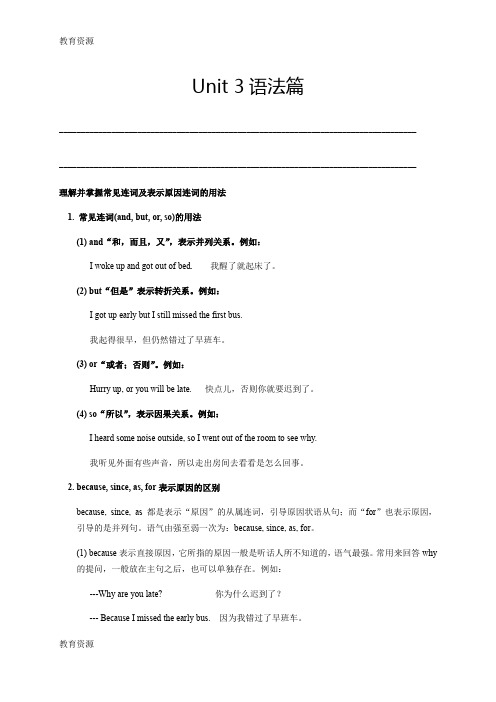
Unit 3语法篇____________________________________________________________________________________________________________________________________________________________________理解并掌握常见连词及表示原因连词的用法1. 常见连词(and, but, or, so)的用法(1) and“和,而且,又”,表示并列关系。
例如:I woke up and got out of bed. 我醒了就起床了。
(2) but“但是”表示转折关系。
例如:I got up early but I still missed the first bus.我起得很早,但仍然错过了早班车。
(3) or“或者;否则”。
例如:Hurry up, or you will be late. 快点儿,否则你就要迟到了。
(4) so“所以”,表示因果关系。
例如:I heard some noise outside, so I went out of the room to see why.我听见外面有些声音,所以走出房间去看看是怎么回事。
2. because, since, as, for表示原因的区别because, since, as 都是表示“原因”的从属连词,引导原因状语从句;而“for”也表示原因,引导的是并列句。
语气由强至弱一次为:because, since, as, for。
(1) because表示直接原因,它所指的原因一般是听话人所不知道的,语气最强。
常用来回答why的提问,一般放在主句之后,也可以单独存在。
例如:---Why are you late? 你为什么迟到了?--- Because I missed the early bus. 因为我错过了早班车。
【教育资料】北师大版初二(上)英语第6讲:unit 3 语法篇(教师版)-学习专用
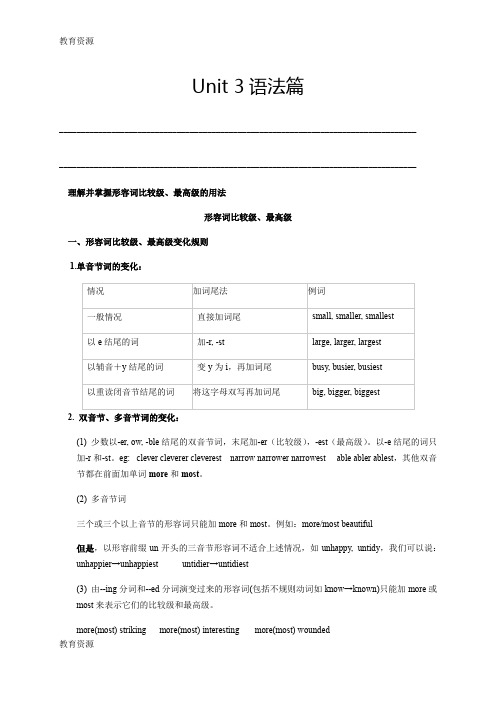
Unit 3语法篇____________________________________________________________________________________________________________________________________________________________________ 理解并掌握形容词比较级、最高级的用法形容词比较级、最高级一、形容词比较级、最高级变化规则1.单音节词的变化:2. 双音节、多音节词的变化:(1) 少数以-er, ow, -ble结尾的双音节词,末尾加-er(比较级),-est(最高级)。
以-e结尾的词只加-r和-st。
eg: clever cleverer cleverest narrow narrower narrowest able abler ablest,其他双音节都在前面加单词more和most。
(2) 多音节词三个或三个以上音节的形容词只能加more和most。
例如:more/most beautiful但是,以形容前缀un开头的三音节形容词不适合上述情况,如unhappy, untidy,我们可以说:unhappier→unhappiest untidier→untidiest(3) 由--ing分词和--ed分词演变过来的形容词(包括不规则动词如know→known)只能加more或most来表示它们的比较级和最高级。
more(most) striking more(most) interesting more(most) wounded3. 不规则形式bestworstmany /much mostleastfurthestold older oldest /elder eldest二、形容词原级、比较级和最高级的用法1. 形容词原级用法:(1)修饰原级的词:very, too, so, quite(2)同级比较as + adj 原级+ as 例如:Tom is as tall as Mike. Tom和Mike一样高。
北师版初二(下)英语第6讲:Unit3语法篇(教师版)

Unit 3 语法篇____________________________________________________________________________________________________________________________________________________________________学生通过本讲学习,能够掌握本单元的重点词汇句型,并在综合能力上有一定的拓展。
在完成时的结构现在完成时由“have/has+过去分词”构成,主要有两个含义:① 表示动作发生在过去,但与现在的情况有联系,有时无时间状语,有时和一些表示不确定的过去时间状语连用,如:many times,just,yet,ever,never,just,already,before,so far, by now等连用。
②表示从过去某一时间开始一直延续到现在并还可能继续延续下去的动作,用于延续性动词,且句中常带有表示一段时间的时间状语,如:since + 时间点/从句,for two months, so far等。
1)现在完成时和一般过去时都能表示过去发生过的动作,但现在完成时表示过去动作对现在的影响,并且表示这一动作已完成或还可能继续下去;2)而一般过去时与现在的情况没有联系,仅表示过去的动作,且这一动作到说话时已终止。
因此现在完成时不能与表示明确的过去时间如:in1949,yesterday,last week等的状语连用,并且用when或where对这些时间和地点状语提问时,一般只用一般过去时。
三、在“it is first/second...time that...。
”或在“it/this/that is the +最高级+名词+that...。
”结构中,that从句中的动词常用现在完成时;在“it + be ...+since从句”这一结构中,be可用一般现在时或现在完成时,since从句一般用过去时。
初三英语复习Unit6知识精讲 北师大版
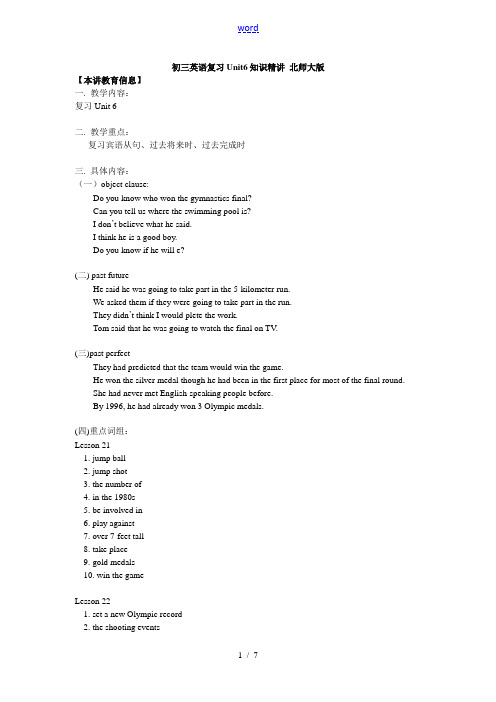
初三英语复习Unit6知识精讲北师大版【本讲教育信息】一. 教学内容:复习Unit 6二. 教学重点:复习宾语从句、过去将来时、过去完成时三. 具体内容:(一)object clause:Do you know who won the gymnastics final?Can you tell us where the swimming pool is?I don’t believe what he said.I think he is a good boy.Do you know if he will e?(二) past futureHe said he was going to take part in the 5-kilometer run.We asked them if they were going to take part in the run.They didn’t think I would plete the work.Tom said that he was going to watch the final on TV.(三)past perfectThey had predicted that the team would win the game.He won the silver medal though he had been in the first place for most of the final round.She had never met English-speaking people before.By 1996, he had already won 3 Olympic medals.(四)重点词组:Lesson 211. jump ball2. jump shot3. the number of4. in the 1980s5. be involved in6. play against7. over 7-feet tall8. take place9. gold medals10. win the gameLesson 221. set a new Olympic record2. the shooting events3. the women’s 10-meter air rifle event4. …be similar to …5. be in the first place6. e from behind7. imagine doing8. achieve the amazing success9. have sb. in …team10. be in good health11. bee a member of national team12. the World Table Tennis ChampionshipLesson 231. plete the run2. take part in3. lose one’s home4. collect money for sb.5. plenty of6. feel embarrassed7. for the two weeks before the run8. encourage sb.9. catch up with10. It takes sb. sometime to do sth.11. leave sb. behind12. wait for13. do one’s best14. keep healthy15. do regular exercisesLesson 241. host the 2008 Olympics2. be crowded with3. celebrate the success4. the Olympic movement5. have special influence6. in contrast7. two thirds of the people8. pete for hosting Olympic9. understand the spirit of Olympics【典型例题】一、单项选择1. They are those ______ bags. Please put them on the bus.A. visitorB. visitorsC. visitor’sD. visitors’2. Pass_____ the knife, please. My pencil is broken.A. IB. meC. myD. mine3. ——What else do you want?——Oh, we don’t need ________.A. nothing elseB. something elseC. more elseD. anything else4. Please keep the classroom ________.A. cleanB. cleaningC. cleanedD. cleans5. ——Li Lei did very well in the English exam.——Oh, yeah! He is ________ English.A. weak inB. angry withC. good atD. afraid of6. Walk along this road, and _____ the first turning on the right.A. getB. takeC. bringD. go7. Could you __________ me a ruler? Mine is broken.A. lendB. lend toC. borrowD. borrow from8. These pictures will show you _______.A. what does our hometownB. what our hometown looks likeC. how does our hometown look likeD. how our hometown looks like9. Do you know _______ during the ing summer holiday?A. what will Tom doB. what did Tom doC. what Tom will doD. what Tom did10. Could you tell me ______? I have something interesting to tell him.A. where is Li HongB. where Li Hong isC. where was Li HongD. where Li Hong has been to11. Mr. Zhang said he his old house and buy a new one.A. had soldB. would sellC. sold12. They never knew what to the world in a hundred years.A. will happenB. had happenedC. would happen.13. I already home when it began to rain.A. have, gotB. had, gotC. would, get14. By yesterday afternoon, five people their lives in the traffic accident.A. had lostB. lostC. would lose15. When we saw his worried face, we thought he bad news of his son.A. was havingB. has hadC. had had16. How long each other before they got married?A. had they knownB. have they knownC. would they know17. He was born________ the morning of June 1st.A. inB. onC. byD. at18. I don’t know what they are ________ about.A. tellingB. speakingC. talkingD. saying19. ——________I e here the day after tomorrow?——No. you needn’t.A. MustB. ShallC. MayD. Will20. The teacher asked the boy’s mother________ the boy out of schoo1.A. to takeB. talkC. tookD. take21. Could you tell me________ ?A. where Mary es fromB. where Mary came toC. where did Mary e toD. where does Mary e from22. She has never been to Shanghai,________?A. has sheB. is sheC. hasn’t sheD. was she23. You must study hard. or you’ll fall________.A. downB. offC. overD. behind24. He has studied English________.A. for two years agoB. since two yearsC. since two years’timeD. for two years25. Please tell me________ he is at home or at the office.A. whereB. whichC. whatD. whether26. The little boy knew that the Olympic Games________ in China.A. holdsB. is heldC. will be heldD. would be held二、句型转换。
- 1、下载文档前请自行甄别文档内容的完整性,平台不提供额外的编辑、内容补充、找答案等附加服务。
- 2、"仅部分预览"的文档,不可在线预览部分如存在完整性等问题,可反馈申请退款(可完整预览的文档不适用该条件!)。
- 3、如文档侵犯您的权益,请联系客服反馈,我们会尽快为您处理(人工客服工作时间:9:00-18:30)。
1. 常见连词 (and, but, or, so)的用法
(1) and“和,而且,又” ,表示并列关系。例如:
I woke up and got out of bed.
我醒了就起床了。
(2) but “但是”表示转折关系。例如:
I got up early but I still missed the first bus.
我听见外面有些声音,所以走出房间去看看是怎么回事。
2. because, since, as, for表示原因的区别
because, since, as 都是表示“原因”的从属连词,引导原因状语从句;而“ 引导的是并列句。语气由强至弱一次为: because, since, as, for。
for ”也表示原因,
Unit 3 语法篇
__________________________________________________________________________________ __________________________________________________________________________________
3. You ’d better wake up Tom at 6: 30, ______ he will be late for the match.
A. but
B. and
C. or
D. so
4. To make our dreams come true, we should have aims________ then try out best to achieve it.
昨晚一定下了雨,因为地面是湿的。 3. 其他常见连词
(1)if 如果,表示条件,引导条件状语从句。
unless, 除非,如果不 =if … not。例如:
If it doesn ’t rain tomorrow, we will go to the park.( 前半句可改为 Unless it rains tomorrow)
A. before
B. when
C. since
D. until
7. It is dark, _______ let ’s go home.
A. so
B. an________ I ’m a little disappointed, I can still accept the result.
(1) because 表示直接原因, 它所指的原因一般是听话人所不知道的, 的提问,一般放在主句之后,也可以单独存在。例如:
语气最强。 常用来回答 why
---Why are you late? 获取更多资源,请加微信: tsat169
你为什么迟到了? QQ: 919623953
--- Because I missed the early bus. 因为我错过了早班车。
A. Since
B. Because
C. Although
D. For
获取更多资源,请加微信: tsat169 QQ: 919623953
9. We will stay at home, ________ there is a traffic jam tomorrow.
A. if
B. unless
我起得很早,但仍然错过了早班车。
(3) or“或者;否则” 。例如:
Hurry up, or you will be late. 快点儿,否则你就要迟到了。
(4) so“所以”,表示因果关系。例如:
I heard some noise outside, so I went out of the room to see why.
A. and
B. but
C. so
D. or
5. I didn ’t go surfing, _________ it was too cold.
A. though
B. so that
C. because
D. since
6. Rick has learned a lot about Chinese culture ________ he came to China.
C. but
D. because
10. ---Hello, Joyce, you are busy. Can I give you a hand?
since 语气弱,没有 since 正式,常译为“由于,鉴于” 。从句说明原因,主句说明结果,主从句 并重。例如:
As I was not ready, they went without me.
由于我没有准备好,他们没有带我去。
(4) for 表明附加或推断的理由,其后的分句不能放句首,语气最弱。例如: It mush have rained last night, for the ground is wet.
如果明天不下雨,我们就会去公园。
(2)although 虽然,尽管,引导让步状语从句。不与 but 连用。例如:
Although no man agreed with him, he held on his views.
尽管没人赞同他的观点,他还是坚持自己的看法。
1. Tom was late for school __________ it ’s raining hard.
(2) since 侧重主句,从句表示显然的或者已为人所知的理由, 稍弱,通常置于句首,表示含有一种勉强语气的原因。例如:
常译为“因为,既然”,语气比 because
Since everybody is here, let ’s begin. 既然大家都在这里,我们开始吧。 (3) as 是常用词,它表示的原因是双方已知的事实或显而易见的原因,或者理由不是很重要;比
A. because of
B. because
C. due to
D. so
2. Read this article, ________ you will understand that not everything can be bought with money.
A. or
B. so
C. but
D. and
